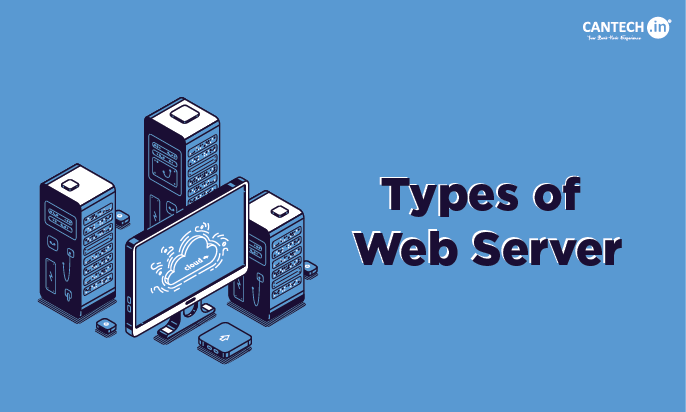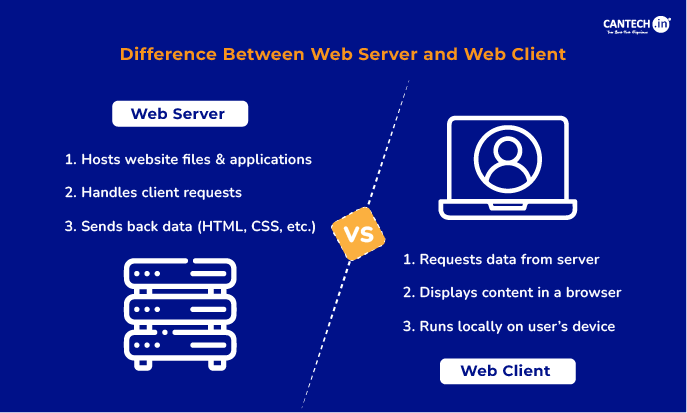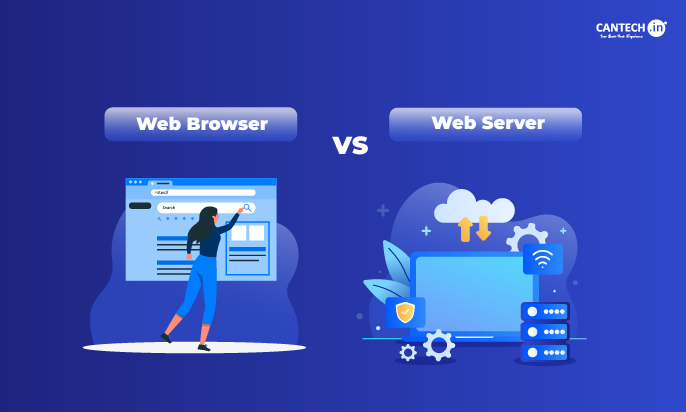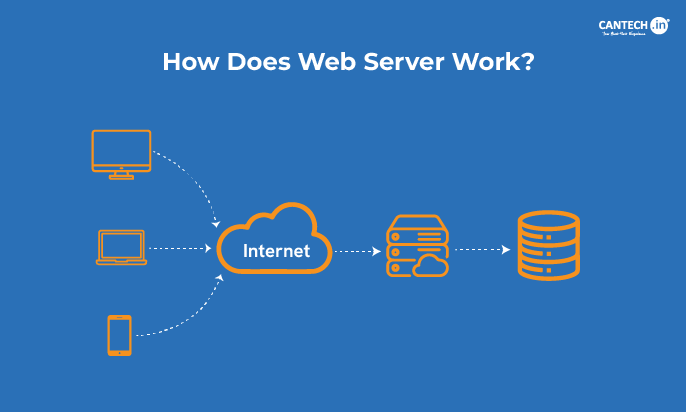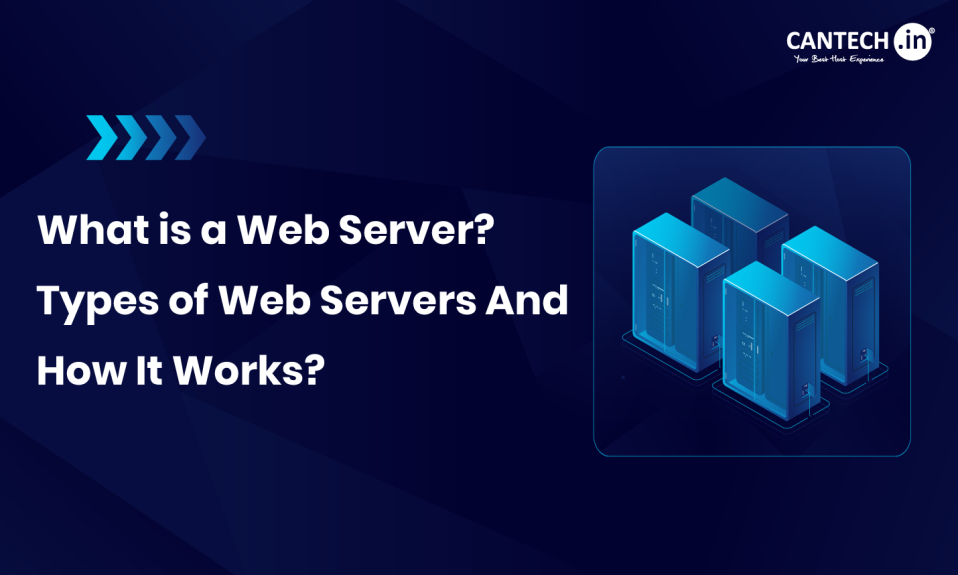A website is the main pillar of your business. It’s the medium through which your business is known to thousands and millions of users online.
But how about making this website visible online? Yes!
A web server serves as the backbone of the Internet and plays a super crucial role in ensuring websites and applications are accessible to users worldwide.
Whether you’re streaming a video, shopping online, or reading a blog, a web server processes your request and delivers the required content seamlessly. In fact, there are different types of web servers each with its own uniqueness and benefits.
In this guide, we will introduce you to the concept of web server, its different types, uses and more. So, keep reading till the end!
Understanding What is a Web Server?
A web server is basically any hardware or software that uses Hypertext Transfer Protocol) HTTP and other protocols to transmit the requested web content over the Internet. Its main job is to deliver the website content such as images, texts and videos to users online.
The hardware component of a web server stores the website data while the software is responsible for processing requests and providing content such as HTML pages, images, and scripts.
In the context of web hosting, web servers are highly important as they store and process files required to make websites accessible.
How Does Web Server Work?
In simple words, a web server acts as a go-between the user’s browser and the website. If you enter the URL of a website in the address bar: for example: www.cantech.in or click on a link, the browser sends a request to the web server hosting the website. The working is this simple!
The server then processes the request, fetches the resources that the website requires, be it HTML files, CSS stylesheets, images, or JavaScript files and then displays it to the web browser.
Web servers have a structured process for data exchange. This is how they work:
- Receive the Request: Firstly, the web server receives a user request, in the form of HTTP or HTTPS protocols.
- Process the Request: It identifies the requested file or resource and retrieves it from the stored data.
- Deliver the Content: Finally, the web server sends the requested data back to the user’s browser, allowing them to view the webpage.
The best part is, the entire process takes place in milliseconds, allowing users to browse websites within flash.
While a web server processes and delivers website data, a web browser retrieves and displays it for users. To better understand their roles, check out this guide on the difference between web server and web browser.
Popular Uses of Web Servers

Web servers perform a range of functions beyond simply hosting websites.
Some of their key uses include:
1. Data Storage and Security
Security is paramount when it comes to websites. Web servers securely store website data, keeping sensitive information protected from unauthorized access.
2. Dynamic Content Generation
Web servers are mainly used to develop dynamic web pages with the help of scripting languages like PHP, Python, and Ruby. This creates interactive features for websites, offering personalized content.
3. Virtual Hosting
One of the most important advantages of web servers is that they can host multiple websites on a single server.
This feature, known as virtual hosting, is particularly useful for businesses and individuals looking to save on hosting costs while maintaining multiple online properties.
4. File Sharing and Media Streaming
Web servers play a key role in file sharing and streaming media services. Online video sites, such as YouTube, Netflix, and Spotify, depend on web servers to deliver content to audiences across the globe.
Sharing Different Types of Web Servers
There are numerous web servers that are suited for various needs and tastes. Here’s a list of the most common ones.
1. Apache HTTP Server
Apache is one of the most widely used web servers across the globe. It’s famous for flexibility and features that are abundant in this software.
Apache supports Windows, Linux, and macOS. Being an open-source software, Apache offers maximum flexibility and can be easily customized to fit the needs of developers.
2. Nginx
Often considered the second web server after Apache, Nginx is great in terms of performance, scalability, and efficient usage of resources.
It basically works on an event-driven architecture to make it work best for handling more than one request at a given time with fewer memory consumptions. This feature makes it a go-to choice for hosting high-traffic websites and applications.
3. Microsoft Internet Information Services (IIS)
IIS is a web server developed by Microsoft, known for its good performance and complete integration with the Windows operating system.
Although the customer support is excellent, and it’s easy to use, IIS is proprietary, meaning that the code of this software isn’t open to modification. Even so, IIS is an excellent choice to host applications using the Windows OS.
4. Lighttp
Lighttp, is a lightweight web server known for speed, security, and low CPU usage. It is especially popular among developers who seek an efficient solution for hosting websites on devices with limited resources.
5. Sun Java System Web Server
This server from Sun Microsystems boasts of being extremely powerful in its performance.
Additionally, the product supports other technological innovations, for example, JSP (JavaServer Pages), and Server-Side JavaScript, which it incorporates into it. It has also seen extensive application within medium and large-scale sites that are noted to be extremely reliable and scalable.
6. Node.js Web Server
Unlike other web servers, Node.js is a runtime environment where developers can create network applications using JavaScript.
Node.js Web Server is popular for its event-driven architecture and asynchronous I/O capabilities, which makes it highly efficient in real-time communication and browser-based applications like games and chat systems.
7. Jigsaw Web Server
Jigsaw, a web server experiment developed by the World Wide Web Consortium, or W3C, was implemented in Java with advanced architecture.
As a project that was once a test environment for new web technologies, it is now becoming a full-featured web server that offers interesting features and flexibility.
How to Select the Best Web Server?
Choosing a web server is an important process. You. need to consider several key factors to determine if it is appropriate for your needs. Here are some things to consider:
1. Purpose and Compatibility
Know the purpose of the website and double check if the web server can support such requirements. It must be compatible with the operating system and other servers in your infrastructure.
2. Hosting Environment
Check whether the server goes well with your hosting setup. It could be shared, dedicated, cloud-based, or a hybrid. This is important.
3. Scalability
Choose a server that will not compromise in case of a sudden traffic surge. Scalability is important in maintaining uptime and user experience when there are peak events.
4. Server-Side Programming Support
Check whether the server supports the programming languages, frameworks, and technologies you plan to use.
5. Security Features
The server’s security features include encryption, firewalls, and defense against DDoS attacks and other common threats.
6. Built-In Tools
There are built-in tools like content management systems, SEO utilities, and publishing features that help with website management.
7. Customer Support
Look for a provider with good customer support, regular data backups, and a good guaranteed uptime.
8. Performance
High web server throughput as well as less latency are highly important to form a high performance web server; ensure it gets configured to tune these parameters.
But additionally, you would realize that your web servers, by default, have different settings, and configurations based on the necessity of your respective needs.
But a proper scrutiny of these matters will ensure to choose a good web server with respect to how it supports website growth, safety, and also performance.
Why Are Web Servers Essential: The Final Lines
Web servers are indispensable for the functioning of websites and web applications. They ensure that users can access content seamlessly, regardless of their location or device. Without web servers, the internet as we know it would cease to exist.
Whether it’s hosting websites, streaming media, powering eCommerce platforms, or real-time communication, web servers will continue to take center stage in shaping the digital landscape.
Understanding the various types of web servers is just one piece of the puzzle. To get a full picture of how the web works, don’t miss our breakdown of the difference between web server and web client.
Frequently Asked Questions
What is a web server, and how does it work?
A web server is a computer system that takes up requests from clients and responds with the corresponding web pages. It acts as an intermediary between a user’s browser and the requested website.
What are some of the most common web servers?
Popular web servers include Apache, Nginx, Microsoft IIS, and Lighttpd, each with its own set of features in hosting websites.
How does a web server manage multiple requests?
Web servers usually employ event-driven or multithreaded design architectures to cope with multiple simultaneous user requests as efficiently as possible.
What is a web server and its difference from web hosting?
Web servers constitute the technology that facilitates the delivery of website content whereas web hosting stands for the actual service that furnishes storage plus accessibility for any website.
Can a single web server have multiple websites on it?
Yes, using virtual hosting, a single web server may host multiple websites, making it cost-effective and efficient for businesses.
